
|
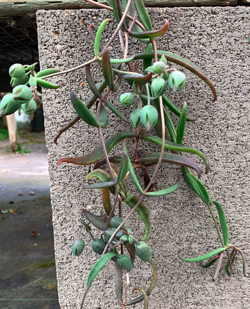
|
Kalanchoe beauverdii
Code: 90652
Price: $9.95
Quantity in Basket:
none
|
(Syn.: Bryophyllum beauverdii), Beauverd's Widow's Thrill, False Hoya
This is a very unusual kalanchoe that is sure to attract attention. It's one of the few climbing species along with Kalanchoe schizophylla. This succulent climber has gray wiry stems and green narrow leaves turning purple-black in high light with adventitious plantlets often forming on the leaf tips. Its hanging flowers are bell-shaped and rather large compared to the slender stems. Blooming in clusters, they are an unusual grayish green color with fine purple speckles. Flowering is in the winter and spring months. The wiry stems and hooked leaves help it vigorously scramble and twine upwards. It can swallow surrounding plants if not pruned to keep it under control. So it is best to grow it on a trellis to 8 feet or in a hanging basket where it can be allowed to cascade. Grow in full sun or bright shade and allow it to get dry between waterings. It generally likes warmth with dry cool frost-free winters. It's native to south and southwestern Madagascar, where it is found in dry shrub-land forests from sea level up to 2,750 feet in elevation.
Crassulaceae
|
| |
|

|
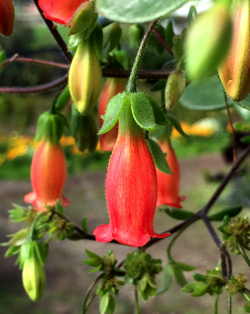
|
Kalanchoe manginii
Code: 90649
Price: $11.95
Quantity in Basket:
none
|
(Syn.: Bryophyllum manginii), Chandelier Plant, Beach Bells
This succulent plant displays spoon-shaped glossy green fleshy leaves, turning reddish in full sun, with trailing red-tinged stems. It blooms in late winter or early spring with dangling clusters of salmon-red 1 inch bell-shaped flowers. Growing up to 12 inches tall and wide, it makes an easy to grow ideal hanging basket. It also can be grown as an epiphyte, as it does in its native Madagascar. Best grown in a bright sunny location with protection from the midday sun in well-drained potting soil. Intolerant of frost.
Crassulaceae
|
| |
|

|
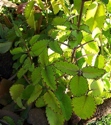
|
Kalanchoe pinnata
Code: 80169
Price: $9.95
Quantity in Basket:
none
|
(Syn.: Bryophyllum pinnatum), Life Plant, Chandelier Plant, Hawaiian Air Plant, Oliwa Ku Kahakai
This succulent plant is often sold to Hawaiian tourists as a souvenir oddity because of its ability to grow small plantlets on its leaf margins, even if just pinned to a curtain in the air. Clustered greenish white to reddish flowers dangle from the flower stalk, as on a chandelier. Fast growing, drought tolerant 2 to 3 feet high. Tolerates almost any conditions, sun or shade, but likes moisture with good drainage. Easy popular house plant. Can also be grown outdoors in mild climates (no frost), but can be invasive in the tropics. Has many tribal and herbal medicinal uses. Naturalized in the Hawaiian Islands, but probably native to Madagascar.
Crassulaceae
|
| |
|

|
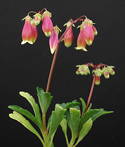
|
Kalanchoe porphyrocalyx
Code: 90536
Price: $11.95
Quantity in Basket:
none
|
(Syn.: Bryophyllum porphyrocalyx), Pearl Bells Kalanchoe
Pearl Bells is a compact, bushy succulent growing up to 8 inches high with slender leaves that are rubbery and irregularly notched. It's very showy with clusters of nodding reddish urn-shaped flowers with creamy colored tips on slender purple-tinted stems. Blooms heavily during the shorter days of late winter for about 7 weeks. Give it bright light or morning sun, well-drained soil, and protection from frost. Allow to dry between waterings. It grows on the ground or up in the trees as an epiphyte in the rainforest areas of central and northeastern Madagascar. Similar to and often confused with Kalanchoe 'Wendy' and 'Lucky Bells'. Crassulaceae
|
| |
|

|
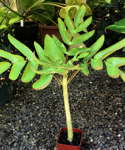
|
Kalanchoe prolifera
Code: 90521
Price: $9.95
Quantity in Basket:
none
|
(Syn.: Bryophyllum proliferum), Blooming Boxes, Tree Kalanchoe
This interesting giant succulent from Madagascar grows 6 to 9 feet tall with its unbranched 1½ inch thick jointed stems holding opposite pairs of fleshy green pinnately compound leaves. Fairly fast growing with flowers appearing after a couple of years that have greenish yellow box shaped bracts and greenish orange flowers in late winter. Later these yield numerous plantlets on the flower stalks. Plant in light shade. Drought resistant and can take a mild frost of short duration. Under certain conditions it might be somewhat invasive because of its prolific production of plantlets.
Crassulaceae
|
| |
|

|
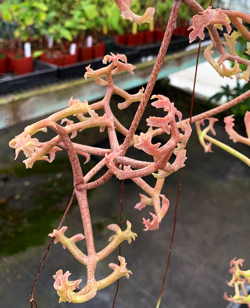
|
Kalanchoe schizophylla
Code: 90653
Price: $11.95
Quantity in Basket:
none
|
(Syn.: Bryophyllum schizophyllum)
This is a very curious kalanchoe, as it is one of the few climbing species along with Kalanchoe beauverdii. Its smooth leaves are deeply cut with a fern-like appearance turning orangish in bright light. It climbs by means of its hook-like finely divided mature leaves. The stems are thin curling up to 12 feet or more in length. The seldom seen inflorescence consists of pendulous, bell-shaped lavender-grey flowers in spring to summer. It seems to be given to vegetative growth so that flowering is rare, especially if frequent pruning has been necessary. The variable leaves are very decorative and the plants are easy to grow. In its native Madagascar it is a hemiepiphyte (seedlings growing in the canopy as an epiphyte, later with roots growing down into the ground). It is found in rocky and shady brush in central Madagascar from 3 to 5 thousand feet in elevation. All parts are toxic, a rarity in the family Crassulaceae. Give it bright shade with extra humidity, well-drained potting soil and water sparingly. Grow it as an epiphyte, in a hanging basket, or as an interesting climber on a trellis. Intolerant of frost.
Crassulaceae
|
| |
|

|
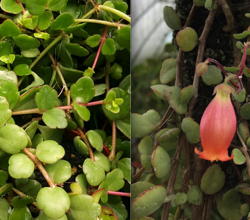
|
Kalanchoe uniflora
Code: 90636
Price: $19.95
Quantity in Basket:
none
|
(Syn.: Bryophyllum uniflorum), Coral Berry, Coral Bell Plant
This is an attractive trailing succulent plant with small fleshy scalloped leaves and an abundance of small coral bell-shaped flowers in late winter. As an epiphytic plant, it grows best in hanging baskets or mounted to a slab in bright, but limited sunlight. Allow it to dry out between waterings. It's drought resistant and should not be overwatered. Grow as an indoor plant or in a greenhouse with warmth and humidity. Native to Madagascar. USDA zones 9- 12.
Crassulaceae
|
| |
|

|
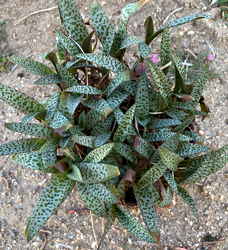
|
Ledebouria socialis
Code: 90642
Price: $9.95
Quantity in Basket:
none
|
(Syn.: Scilla violacea), Silver Squill, Leopard Lily
This is an evergreen bulbous plant from South Africa with silvery leaves dotted with olive green spots and undersides of deep violet. The exposed purplish colored bulbs cluster and multiply quickly filling a pot to overflowing with small spikes of greenish white flowers in May. Easy to grow houseplant treated as a succulent with fast draining soil. Give part shade. USDA zones 8b-10.
Asparagaceae
|
| |
|

|

|
Leonotis leonurus
Code: 52010
Price: $9.95
Quantity in Basket:
none
|
Lion's Tail
This is an erect shrub with unusual fuzzy orange tubular flowers arranged in whorls, blooming from late spring through fall. Grows 4 to 6 feet tall, but may be pruned after flowering to form a more dense and compact plant. It is striking in bloom, and looks good in a mass planting with other flowering shrubs. Plant in full sun in well-draining soil. It is drought tolerant and hardy to the low 20's, resprouting from hardened wood if frozen back. Useful in flower arrangements (burn stem bottoms to seal). Butterfly and hummingbird attractant. Native to South Africa. USDA zones 8 -11.
Lamiaceae
|
| |
|

|
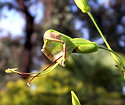
|
Louteridium mexicanum
Code: 90203
Price: $14.95
Quantity in Basket:
none
|
(Syn.: Louteridium conzattii, Neolindenia mexicana), Mexican louteridium
Unusual collector's plant with odd shaped 1½ to 2 inch pale green flowers with pale purple veins. The calx is three lobed, unlike 5 in other genera of the Acanthus family. The stamens and style extend far beyond the corolla mouth. Probably bat pollinated. Grows as a shrub or soft wooded small tree, 10 to 20 feet high. Native to Mexican states of Veracruz, Oaxaca, and Chiapas. Found in wet mountain forests at elevations of 3,500 to 6,500 feet. Plant in area with plenty of moisture and protect from wind as stems are brittle. Minimum temperature of 45F. USDA zones 10 - 11.
Acanthaceae
|
| |
|

|
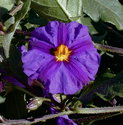
|
Lycianthes rantonnetii 'Royal Robe'
Code: 69087
Price: $9.95
Quantity in Basket:
none
|
(Syn.: Solanum rantonnetii 'Royal Robe') Royal Robe Potato Bush
Very floriferous, over a long season, covered with 1" deep rich purple flowers. Small dark green oval leaves. Often trained into small patio tree or espalier. Fast growing to 12 feet. Royal Robe's flowers are deeper purple than the species, which are lighter, more bluish in color. Native to Argentina and Paraguay. Hardy to 28F. USDA zones 9 - 11.
Solanaceae
|
| |
|

|

|
Mackaya bella
Code: 51901
Price: $9.95
Quantity in Basket:
none
|
A beautiful shrub with slender branches bearing small dark green leaves, having mauve to white flowers in terminal racemes marked with fine purple-pink lines. Bella, meaning beautiful, refers to it's large bell-shaped flowers. It's frost tender and it is advisable to plant in a protected shady spot. Makes a nice container plant. Spring blooming. Native to South Africa.
Acanthaceae
|
| |
|

|
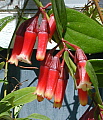
|
Macleania insignis
Code: 60010
Price: $14.95
Quantity in Basket:
none
|
Rare. Epiphytic vining shrub with long slender shoots, woody tuberous base with age. Leaves are reddish, maturing to deep green. Profusion of red tubular flowers tipped white. Can be trained as semi-climber or espalier. Part shade, tolerates cool temps. Central America. 32F.
Ericaceae
|
| |
|

|
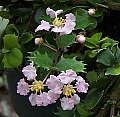
|
Malpighia coccigera
Code: 49705
Price: $9.95
Quantity in Basket:
none
|
Singapore Holly
Glossy green ½ inch holly-like leaves, compact growth, with ½ inch frilly pink fragrant flowers in summer. Edible Berries. Excellent bonsai specimen. Native to West Indies. 40F.
Malpighiaceae
|
| |
|

|

|
Malvaviscus arboreus
Code: 52150
Price: $9.95
Quantity in Basket:
none
|
Turk's Cap
Sprawling evergreen shrub, related to Hibiscus, with pendant bell-shaped flowers. Part shade to full sun. 28F. This one with downy leaves, red flowers.
Malvaceae
|
| |
|

|
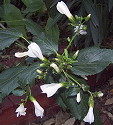
|
Malvaviscus arboreus var. mexicanus 'Alba'
Code: 52151
Price: $9.95
Quantity in Basket:
none
|
(Syn.: Malvaviscus penduliflorus)
Sprawling evergreen shrub, related to Hibiscus, with pendant white bell-shaped flowers. Easily trained as a unique patio tree or useful as a hedge. Very drought resistant. Part shade to full sun. 28F.
Malvaceae
|
| |
|

|

|
Malvaviscus arboreus var. mexicanus 'Blush'
Code: 52154
Price: $9.95
Quantity in Basket:
none
|
Sprawling evergreen shrub, related to Hibiscus, with pendant blush colored bell-shaped flowers. Easily trained as a unique patio tree or useful as a hedge. Very drought resistant. Part shade to full sun. 28F.
Malvaceae
|
| |
|

|

|
Malvaviscus arboreus var. mexicanus 'Red'
Code: 52152
Price: $9.95
Quantity in Basket:
none
|
Sprawling evergreen shrub, related to Hibiscus, with pendant showy red bell-shaped flowers. Easily trained as a unique patio tree or useful as a hedge. Very drought resistant. Part shade to full sun. 28F.
Malvaceae
|
| |
|

|
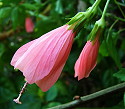
|
Malvaviscus arboreus var. mexicanus 'Rosea'
Code: 52153
Price: $9.95
Quantity in Basket:
none
|
Sprawling evergreen shrub, related to Hibiscus, with pendant pink bell-shaped flowers. Easily trained as a unique patio tree or useful as a hedge. Very drought resistant. Part shade to full sun. 28F.
Malvaceae
|
| |
|

|
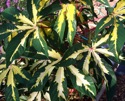
|
Manihot esculenta 'Variegata'
Code: 52120
Price: $10.95
Quantity in Basket:
none
|
Variegated Tapioca
Deeply lobed leaves are beautifully variegated yellow, bordered green. Striking container plant or small tree in mild, frost free climates. Minimum temperature of 50F.
Euphorbiaceae
|
| |
|












































